Junto Club #1: Why I'm Optimistic About Humanity
"If humanity were a publicly traded company, what would be the meaningful KPIs that it delivers to investors making a bet on its future?"
We’re living a moment where the loudest voices in the room are being carried far and wide by negative emotion. Tiny roots of optimism have minimal opportunity to sprout, because the space they need to grow is densely paved over with fear and uncertainty. Yet, nearly every objective measure has shown that we are overlooking the truth; the human story is one of progress. A rich foundation for future prosperity is being laid by the hands of science, technology, rapid evolution, and a newly formed (albeit still finding its footing) collective conscience that will enable us to cooperate on a global scale like never before.
Of course, quickly disregarding positives and obsessing over negatives is clockwork in human nature, no less predictable than the rising and setting of the sun each day. Think about a time something great has happened to you, did you spend an appropriate time appreciating it? Or, more likely, did you find yourself quickly moving onto the next worry in your list of woes? Of course, there is good reason for this in human evolution, but it does not serve us when we’re trying to make educated guesses about the direction of humanity. I’m here before you to argue that the proverbial cat is indeed out of the bag - human progress has reached the point where it cannot be sufficiently contained.
Before continuing, I ask you to keep two things in mind:
A principle of improvement is that things often must become worse before they get better; there are real, hard to eradicate risks facing humanity that will strike blows to quality of life, and life itself, in many parts of the globe. This is true throughout history and will continue to be true in the foreseeable future. I do not want to pretend like everything will be rosy from here on out.
I have to ignore extinction level events that are unforeseen and impossible to predict. For example, there is a non-zero chance that the destruction of the earth happens before we’re able to become interplanetary / intergalactic. In that case, you got me. Human progress would definitely stop.
With that out of the way, let’s dive into the information we do have on hand to try and make an accurate prediction about our collective future.
Human History: A Story of Progress
When evaluating the probabilities of what might happen in the future, we often use the past to offer us clues.
When trying to forecast sales, one must look backwards to observe sales trends, seasonality, and other unique patterns.
When trying to predict the weather, forecasters use historical data to make an informed decision.
If my goal here is to predict what the future of humanity has in store, I must look at its track record of performance and pull out key insights.
If humanity were a publicly traded company, what would be the meaningful KPIs that it delivers to investors making a bet on its future?
Let’s have a look at global poverty from 1820-2018:
Here’s a chart of life expectancy from 1770-2021:
Here’s GDP per capita since 1960:
What about world literacy rates?
Of course, I don’t mean to suggest these are the only measures of human flourishing. Indeed, the world peace index has trended in a bad direction for much of the last two decades, strongly indicating that not all in the world is peachy. Again, there are real problems that we need to wrestle with in the here and now.
I only mean to show that over the course of recorded history, things have generally trended in a good direction. What amazes me about the human story, is that societal progression has in fact been in spite of major impediments. War, plague, famine, and a host of other issues have not been kind to humanity, yet we’re better off today than we have been.
Rate of Innovation In Technology and Science
When examining recorded human history, innovation is a pervasive theme.
It’s important to contextualize the utterly massive impact that singular inventions can have on humanity. Think about the breakthroughs of modern agriculture, and simple machines. Ponder later inventions, such as the printing press, electricity, cars, antibiotics, aviation, and the internet.
With that context in mind, consider that the rate of innovation is increasing rapidly. We create new, and beneficial things at a pace today that is truly unique in our history:
I suspect we will look back twenty years from now, and the present day will seem like the stone ages.
We are on the cusp of truly game-changing innovation at scale in many different domains that are central to human prosperity.
In health, we are making breakthroughs in the R&D of cell therapy, gene therapy, inverse vaccines, amongst other things.
In energy, we are unlocking transformative potential in battery tech, nuclear fusion, and carbon capture. All of these could provide immense benefit to our lived environment.
The advancement of 3D printing, as well as the exciting potential of manufacturing in space, can redefine industry and its relationship to human flourishing.
We’re currently launching satellites into space to provide broadband internet access to underserved parts of the globe.
Generative AI is changing how people work and the rate at which informational assets can be created and processed
The ramification of each one of these breakthroughs can not be understated. Additionally, it should be mentioned that the aforementioned innovations are not a carefully curated list! It’s back-of-the-napkin work, speaking to the volume of innovation in human society.
Artificial Evolution
The internet is ushering in a new era of human intelligence that I call Artificial Evolution. What I mean is that the human mind has potential to start developing at a rate that seems faster than what should be possible given evolutionary constraints. It won’t be that evolutionary processes will actually speed up (at least, to my knowledge), but the ability of every human that is living to access information and learn is currently magnitudes ahead of generations before them.
A common trope we hear frequently is how “everyone thinks they’re an expert”. Indeed, one cannot achieve true expertise in a field of study or domain of knowledge with a week or two of reading about it or listening to podcasts. However, one can effectively transition from functionally zero knowledge, to more knowledgeable than most in a short amount of time if using the internet correctly. Importantly, one may have learned enough to factor new knowledge into one or more decision making processes in the future. If this power is harnessed appropriately, it enables certain phenomenon in society that were unimaginable before:
Large quantities of people working on multiple projects across disciplines throughout their lifetime
A proliferation of informed decision making
Democratization of information, resources, and opportunities
More focus on cultural and physical well-being, since traditional education will be enhanced with technology
The internet is going to build better and smarter human beings. No, the current model is not yet working in this manner entirely. For example, the vast majority of people are using the internet for entertainment, and unfortunately, as a sort of drug to keep their minds occupied.
However, as society starts to realize this problem (and we certainly have started), we’re going to build technology in a more human-friendly way. Technology of tomorrow will be far more additive than it is conflicting with human nature and culture.
I predict we’ll see measures of human intelligence rise faster in the next 50 years than they have the last 50 years. That’s no small prediction given the trend we’ve been on.
Collective Conscience and the Era of Nuance
When Russia invaded Ukraine in 2022, the whole world watched it happen in real-time. People were reacting, very publicly and negatively, to the human tragedy that was taking place.
That pivotal moment struck me, because it was the first moment in which I realized humanity was developing a collective conscience. I also imagined that during large scale invasions of the past (I’ve been fortunate not to live through many in my lifetime), narratives were controlled to an extent that is suboptimal for humanity. Instead of being able to react to a plethora of information, people were being spoon-fed a playbook for how they should react through one or two information sources.
In my introductory paragraph, I eluded to how our newly formed collective conscious is a bit young and under-developed. One way to prove this is to notice how once a consensus starts forming, counter-narratives are constantly born out of thin air. These contrarian views are not always conceived thoughtfully, or on the basis of their merit. For example, when considering the war in Ukraine, the truth is that Russia invaded a sovereign nation and started a war that is causing bloodshed. Their basis for doing so is impossible to justify. Why is it that a non-negligible portion of society feels as though Russia is justified? As humans, we often leap to harmful conclusions, and back those conclusions emotionally due to oversimplification and unhealthy societal norms.
However, with time will come greater learnings, and I am staunchly of the belief that those learnings are happening rapidly. One thing that couldn’t be clearer is that narrative control, contrarianism, and oversimplification, for their own sake are ineffective. This is opening the door to nuance, which has always been there waiting patiently to take the main stage.
While we are indeed living through an era of bite-sized info, where soundbites and short videos seem to win out on our collective attention spans, there has been a quiet resurgence of long-form content. I’ve listened to double digit podcasts in the last two years in which people much more well-informed than I have discussed the Ukraine war from many angles. Access to that level of information was simply impossible in the past!
Platforms like Substack and others are creating a new forum for idea exchange and conversation, the antidote to toxic, fast-info culture. I believe we’re in the earliest stages of society learning how to digest unfathomable access to information. This diet will certainly include a heaping portion of long, complete pieces of information and important context. It will include a heaping portion of nuance.
Let’s Focus On Culture
If there were one societal domain that would enable faster progress in all other facets of humanity, it’s our culture. Of course, human culture cannot be singularly defined, as we are split into nearly infinite groups that have at least some substantial differences in our norms, spirituality, attitudes, and how we socialize.
Yet, there are some elements that are pervasive across a vast number of sub-cultures, and we would be wise to focus on improving upon them:
Religious extremism - imposing societally problematic customs onto others who don’t share your religious views
Intolerance - being generally unagreeable and even acting maliciously to people who are different than you
Oversimplification - not getting to the truth because you have stripped away nuance from a subject in an attempt to create a simple framework for understanding the problem. Simplifying is not inherently bad, oversimplifying is
Tribalism - also not inherently bad, but done often solely to meet our desire to be part of a group. Sometimes, this leads us to be involved with dangerous groups.
Loyalty to our beliefs - characterized by an inability to change our mind when presented with new / better information
To be sure, there are many other cultural ills that are more harmful than they are helpful to a modern society. In an effort not to unearth a problem without offering possible paths forward, let me attempt to answer the question, “how do we improve societal culture?”
I’ve thought long and hard about this question many times, and there are truthfully a few answers that might be useful. When I spend enough time playing out the possibilities, the best choice answer seems to be that we need to attack the problem granularly. I mean really granularly.
The power of individual conversation and fully formed thought expression is something that deserves more credit for its ability to inspire large amounts of change. Playing out your ideas for cultural improvement in real time with your friends and family, even when they vehemently disagree with you, is the exact kind of magic we need. If we’re going to seize the opportunity in front of us and create human utopia, it can’t start from a foundation in which we shy away from important conversations about how to improve.
As a thought experiment, say you were tasked with changing the mind of someone who believes that a certain race of human beings were inherently dangerous. Would you have a better chance of accomplishing this by tweeting about it, or having a series of conversations with them face-to-face?
I’m not advocating that we spend our short lives trying to change the mind of everyone who disagrees with us or harbors dangerous beliefs. However, I am advocating that we don’t shy away from the opportunity when it’s presented, or isolate ourselves from difficult conversations. To that end, we should also constantly challenge our own ideas about what aspects of culture are unhealthy.
To those who would argue that this sort of cultural change is impossible, ask yourself what your opinion would have been during a period of great humanitarian distress, such as the crusades where it’s estimated well over a million people died due to religious extremism? What would your stance have been during either of the world wars?
At times, it does seem as if humanity can’t get out of it’s own way. Yet, we continue to arrive at new heights over the long-run, and we find ourselves in a moment of transformational potential for the quality of our lives.
In the end, humanity itself may be one of the best examples we have of non-linear progress. Just as we must weather through difficult moments in each of our lives, the same approach must be taken collectively. We haven’t proven to possess the ability to stop human suffering completely and without exception. Honestly, we haven’t come very close.
Yet, while we should be sad about the negative aspects of humanity that are present, we should allow optimism of the future to spur us along the path of societal transformation. It’s only when we lose hope of better days that we stop taking the steps necessary to get there. If I could leave this essay with one dying wish, it’s that we all take time to properly marvel at societal advancement throughout recorded history. When we take full stock of how far we’ve come, it becomes clear how far we can still go.


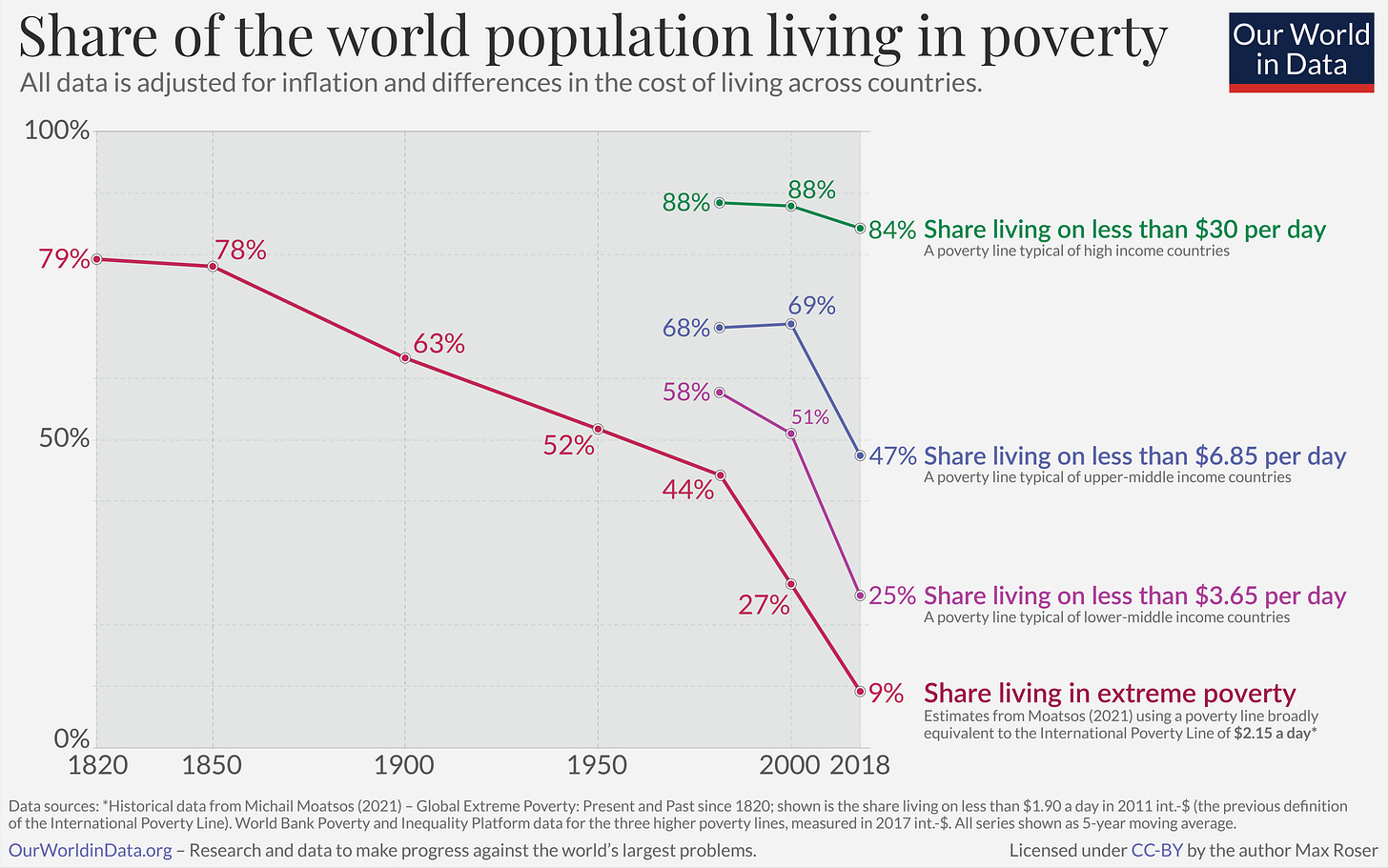
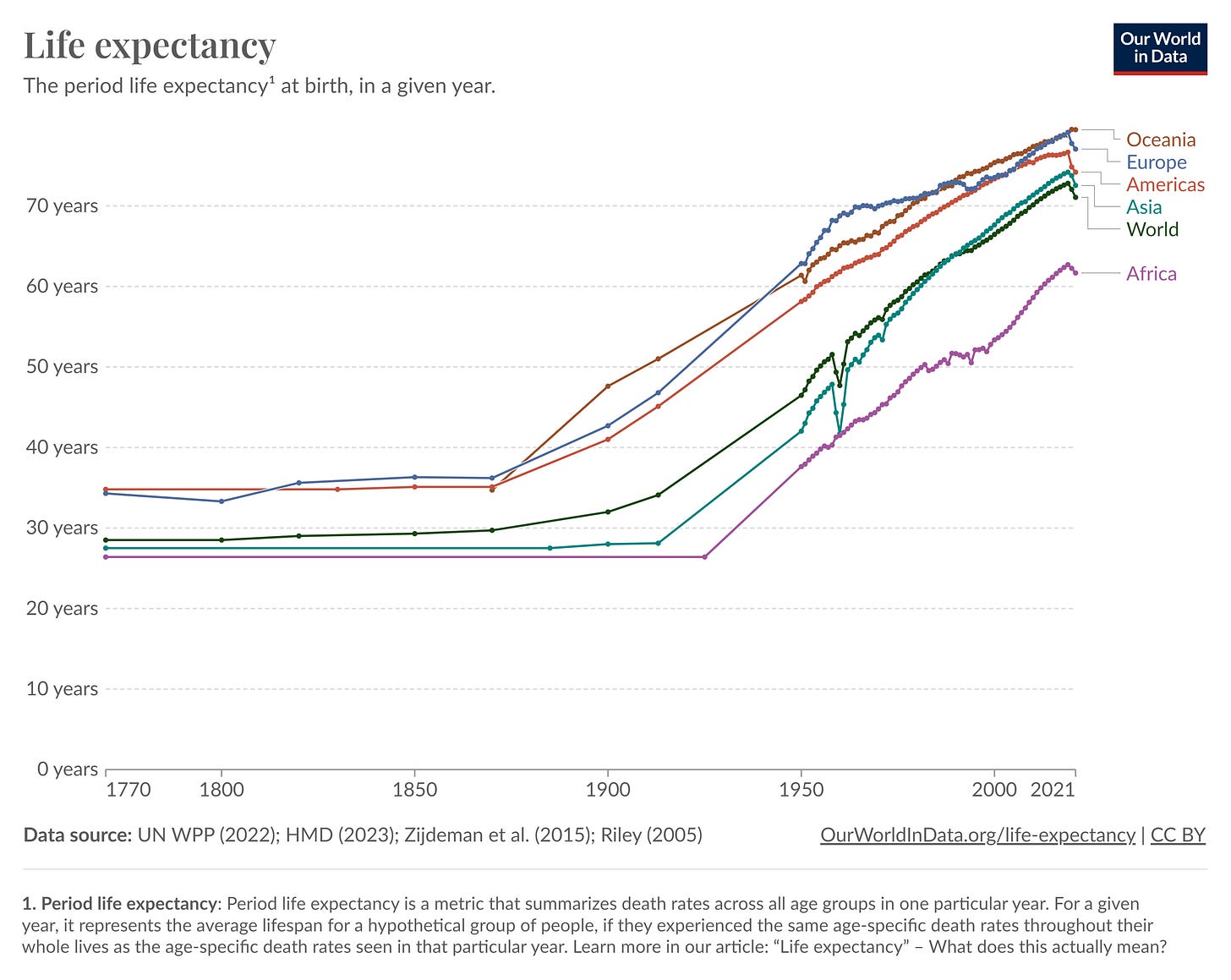
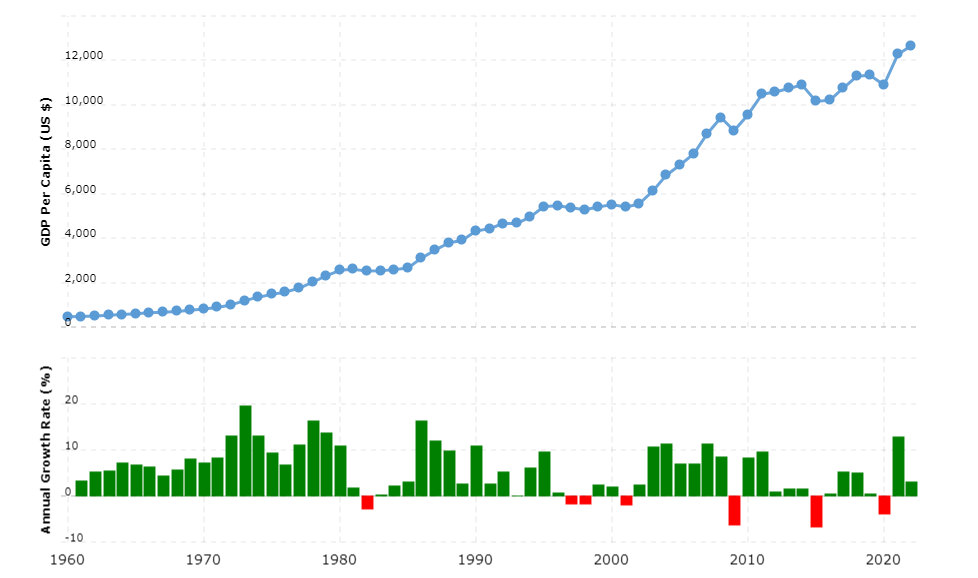
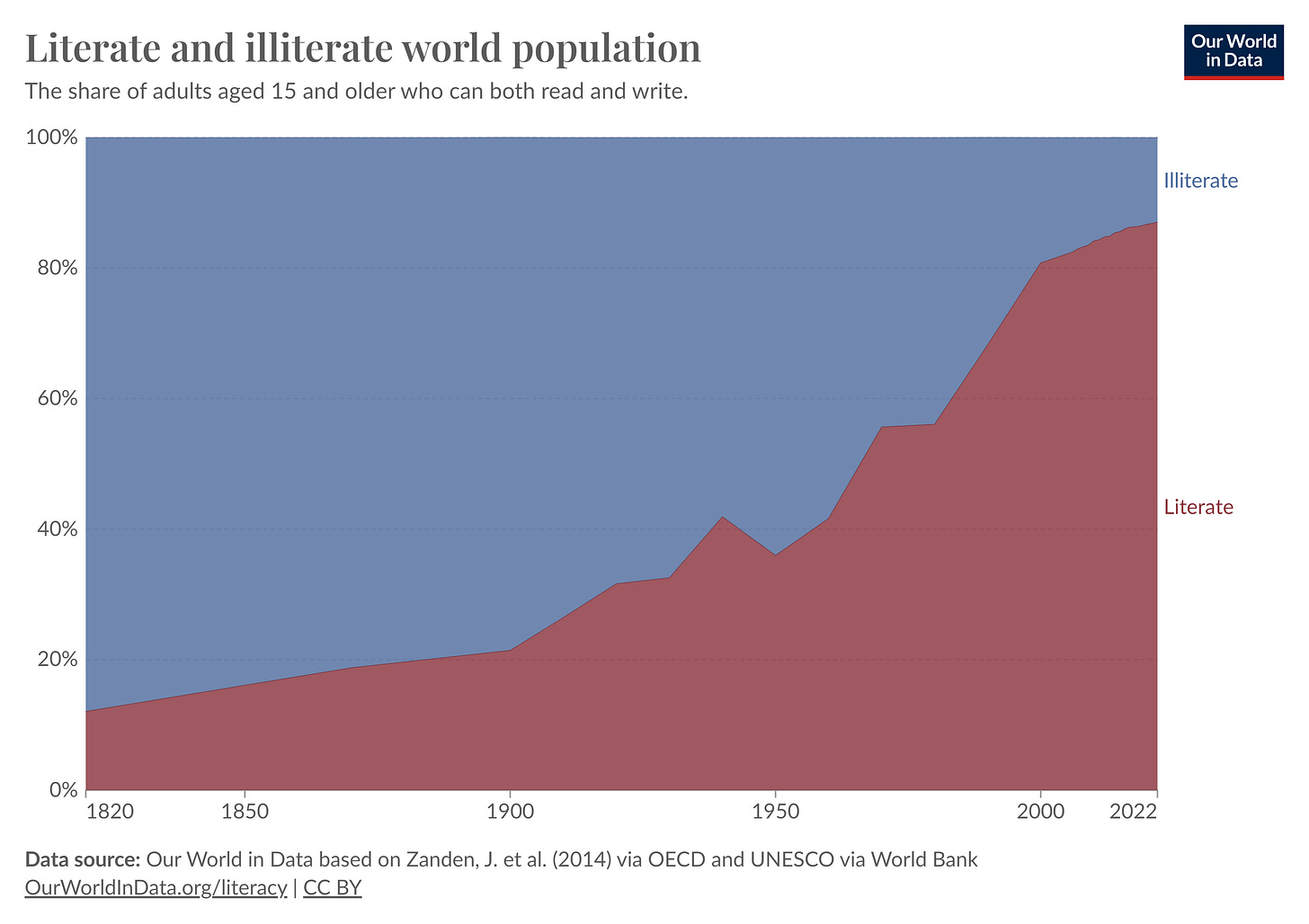
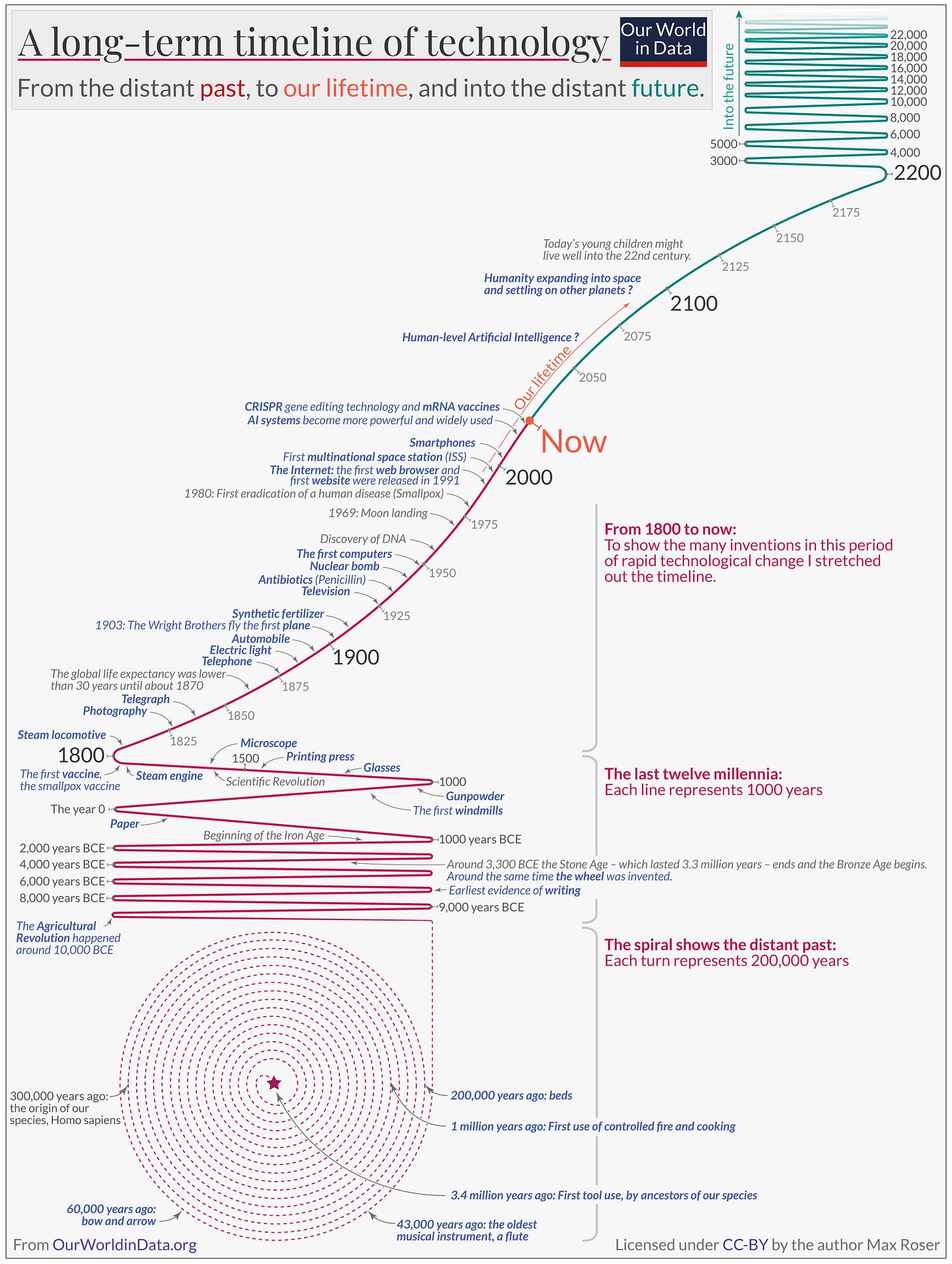
I loved reading this, and agree with your writing. Regarding societies collective consciousness, I believe there are two ways in which this concept will progress. One avenue will be an increased centralization of the collective consciousness, in which people will get all of their information from social media. The other, as you alluded too, will be the percentage of the population who choose to read longer articles, listen to longer podcasts regarding issues, and form more evaluated opinions. I worry that the people who would choose to read a piece like yours are fading away from the collective consciousness. Shorter attention spans are becoming a problem in the modern world, and the issue will only increase. I can't wait to share your work with my friends, I really enjoyed this piece.
"Yet, while we should be sad about the negative aspects of humanity that are present, we should allow optimism of the future to spur us along the path of societal transformation." is a fire bar.
My critique is climate change does not just pose the threat of extinction but erasing a lot of the progress you highlighted - it does and will continue to decrease food security, increase displacement, and other things that lead to societal unrest. We need to use optimism about what we have achieved to spur big transformational change to address climate change.